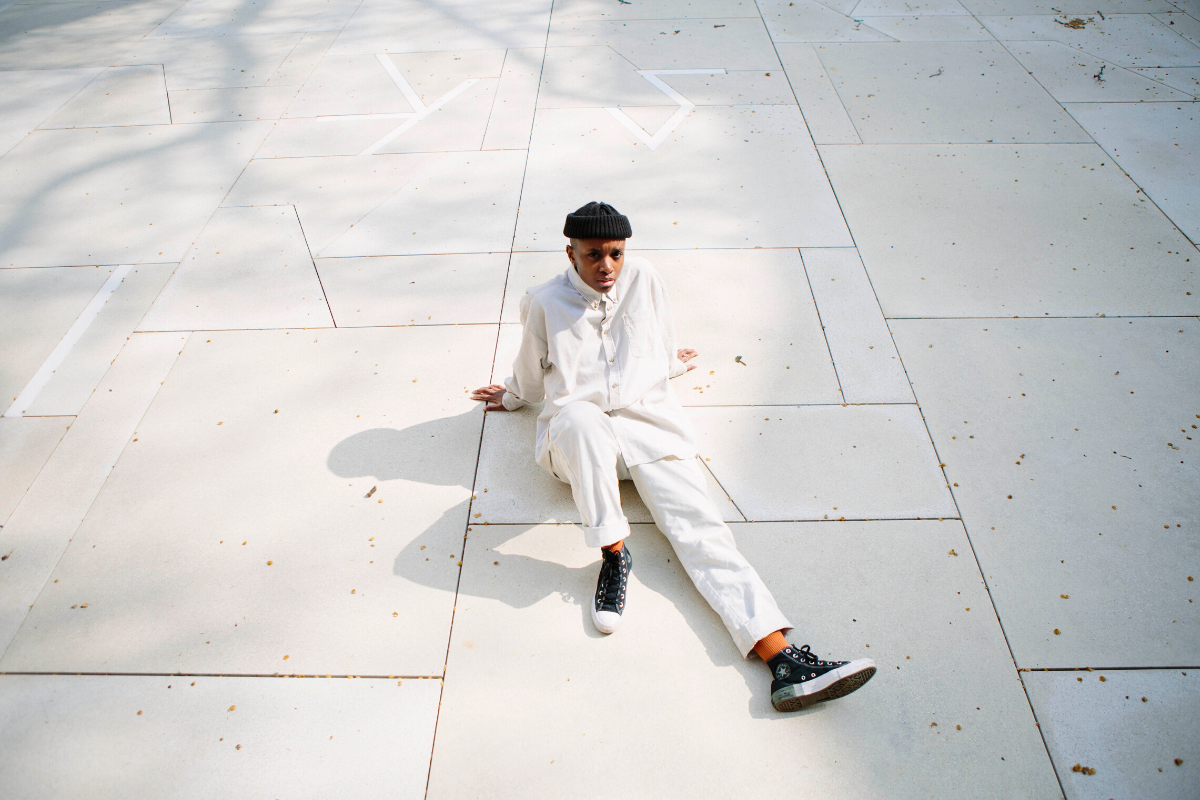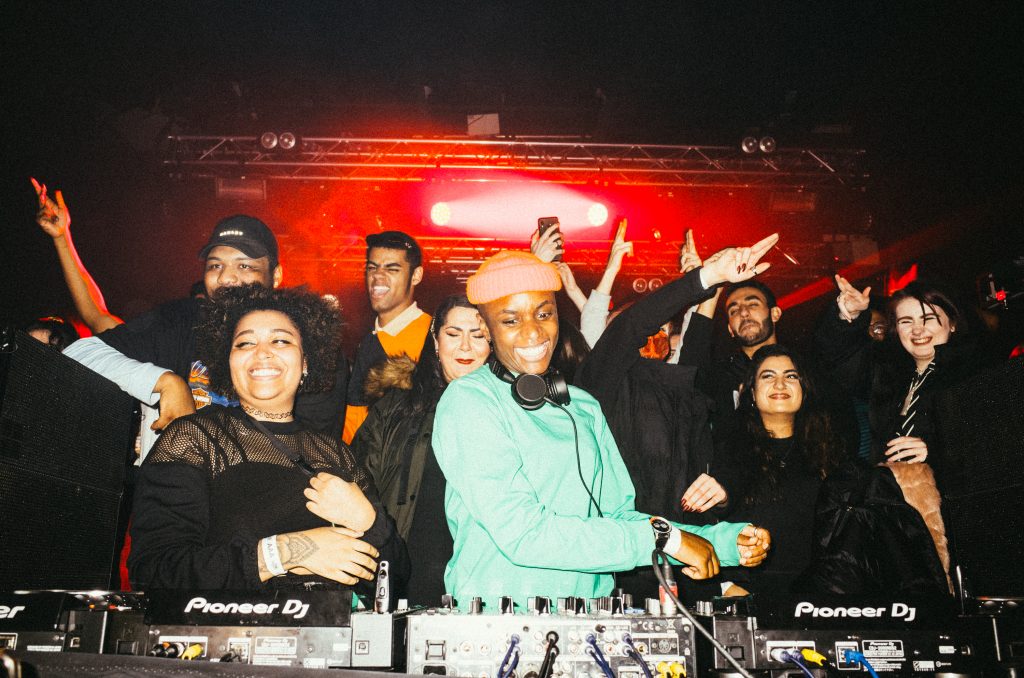
Photography by Alex Lambert
Sherelle’s life has changed quite drastically since we last met. Our first interaction took place just over a year ago, when she was a photographer and videographer for music publication Mixmag. At the time, DJing took more of a backseat, though she was hosting a midweek slot on Reprezent radio and playing locally across London.
Fast forward one year and a viral Boiler Room set later, Sherelle is now a dilating force in the dance music scene, recognisable by her singular moniker. In-demand and in constant motion, her cyclonic welding of jungle, footwork and D’n’B sees her tearing up clubs across the UK and Europe on the regular. Having watched her whirlwind transition into the public eye, I’m curious: how is she dealing with it?.
“It’s been weird to adjust basically,” she begins, her eyes glazed over as if blitzed by dizzying recollections. Retreating from the roaring energy lining the streets of East London, we’re meeting over a pizza at Voodoo Rays in Dalston on a brisk, early evening. “I think the scariest part was the first month after everything.”
In February, Sherelle played for Boiler Room alongside Jossy Mitsu, L U C Y, Riz La Teef and TVSI. The eruptive energy and camaraderie amongst the DJs and crowd sent viewers into a frenzy, the video views leaping into virality the next day. A moment of controversy surrounding a “rewind” by Riz La Teef also caused commotion online, igniting discussions about DJ etiquette. All told, Sherelle hadn’t anticipated the social media storm the video would thrust her way.
Sherelle’s mindset leading up to that Boiler Room is indicative of her genuine impassioned approach to the craft of DJing. Her sole intention, she says, was to showcase some banging jungle and footwork and, hopefully, get some more bookings out of it. When asked by her manager – at the time a colleague – about bringing an agent to the show, she was puzzled. “I don’t need to bring anyone. Nothing’s going to happen from it.” But then it exploded.
“It was a mix of ‘this is fucking outrageous’, but then under the same breath, ‘oh my god!’. This is going to such a wide group of people and basically it’s out of my control. It feels like everyone knows you at that given moment”
– Sherelle
For DJs, Boiler Room is a coveted but nerve-inducing prospect. For women and people of colour these nerves are exacerbated, as they often face an unbalanced proportion of critique and trolling. When Sherelle’s video went viral, she felt a collision of emotions and a loss of control. “It was a mix of ‘this is fucking outrageous’, but then under the same breath, ‘oh my god!’. This is going to such a wide group of people and basically it’s out of my control. It feels like everyone knows you at that given moment.” But overtaking this paralysing shock was a wash of warm feelings as new opportunities started to arise.
Sherelle is honest in her admission that she’s still adjusting. While she’s revelling in playing music and meeting fellow creatives, she’s still not quite settled with her new lifestyle; she struggles with constantly having to be ‘on’. ”You can never really be sad or upset, because you don’t want anyone to assume that you’re – forgive my language – a cunt,” she says.
This wariness of how she comes across extends into how she presents outside of multicultural London. “My general persona, the way I dress, the way I look – I take that into consideration,” she explains, recognising she’s now frequently moving in spaces void of black people. “I often think about the fact that I have to fly the flag for myself as a black woman, a black queer woman. All of these various different things – that’s the added part of the ‘DJ life’. It’s sick going around, but I also understand that I’m travelling whilst black.”
“Flying the flag” is a term that Sherelle scatters throughout our conversation, and it’s obvious she waves that flag with pride. She’s proud she can be a point of representation and break down archaic barriers. “I think the best responses I’ve had is that there have been people who are exactly like me who have come up to me and said, ‘Oh my god, I’ve seen your Boiler Room, you’re fucking sick! You’ve given me the strength to be the DJ I want to be. It’s weird for me to hear that because there are collectives like gal-dem or BBZ who have been doing all this for a very long time but weirdly enough for some people their first entry of seeing another person like themselves is me.”

Having struggled with aspects of her identity as a teenager, Sherelle understands the importance of this representation. Like many black people who’ve grown up in white-dominant neighbourhoods, she battled with her hair; angry at it, relaxing it then eventually needing to shave it off. Her desire to wear traditionally masculine clothing was at odds with her highly-feminine Essex highschool surroundings, but she worked hard internally to redefine femininity for herself, and this inner dialogue built a solid foundation of strength. “There are so many different paths that I’ve had to think about and I’ve become at one with all of these thoughts,” she divulges “You have to accept who you are.”
A few weeks prior, I caught Sherelle in a B2B with her friend and fellow rising talent Fauzia at Unsound Festival in Poland. I recounted how I clawed my way through the white-dominated crowd to the front; I wanted them to see black bodies dancing in support. Sherelle expresses that she appreciates how diverse her audience is, though when she plays she makes a point to look for a woman or PoC in the crowd to try and talk to. She says she felt warmed looking out into the crowd that night; stunned to find herself closing a party in Krakow with an audience going wild to the sounds of jungle.
“You have to constantly remind people where the music is coming from, especially with the sound that I play. Jungle is a black genre”
– Sherelle
The performance even earned her props from Discwoman co-founder Frankie Decaiza Hutchinson, who Sherelle affirms is a much-needed figure in the scene due to her tireless commitment to educating. She also feels this weight, and a disconnect from certain large-scale raves lacking in black people where DJs play trendy but “soulless” minimal house and techno that strays from its black and queer roots. “You have to constantly remind people where the music is coming from, especially with the sound that I play. Jungle is a black genre. It turned into drum and bass and same thing with footwork. People who are making footwork are black people. I think that sometimes people can forget that,” she continues, “If they [big promoters and DJs] really understood the root of that music, they’d be able to get to the tracks that can make you go ‘yeah!’. People like OK Williams and Jayda G are fucking sick, and when they’re doing their version of techno you can hear it, you can feel it. Someone like Fauzia or Jossy – you can hear it when they play it and you fucking dance to it. It doesn’t matter what colour you are.”
Sherelle finds deep fulfilment in playing the sounds that have shaped her experience as a black woman to crowds across Europe. She’s set to imprint this onto her new record label Hooversound Recordings, that she’s co-started with friend and Apple Beats 1 presenter Naina. The debut release will come early next year from Hyroglifics and Sinistarr, and will be the first in a series of releases pushing the jungle, 160 and bass sounds they love. She speaks of the label with excitement and confidence, reiterating how important it is that two women are running a label and “flying that flag.”
Alongside Naina, Sherelle has found a deep well of support from her allies in the 6 Figure Gang. We discuss how, in an industry dominated by white men, men see themselves represented in so many varied ways – their support is global. For women, non-binary and PoC artists who don’t receive that, community and support systems are vital so they don’t feel alone. Especially in the presence of online trolls, who Sherelle has recently dealt with.
“People just want to chat shit about you and for me, I have no time. I’m gonna make my money, I’m gonna do my bookings and I’m gonna take up a lot of space within this scene”
– Sherelle
A few days prior, a group of men had commented “f*****” on an Instagram post, adding her into a group called “Kn***er”. Despite it being her first clash with outright racism and homophobia online, she wasn’t surprised it happened because, “sometimes in dance music, a lot of people can be really brutal.” She trolled them back, sending memes and comically calling them out on her Instagram story – though she adds: “Anyone of colour is going to go through shit like this and, as much as I’m being jovial about it, it’s actually quite fucked up to be called a f***** and a n***** only on the basis that you DJ.” But on the flipside of that, she doesn’t let it shake her. “People just want to chat shit about you and for me, I have no time. I’m gonna make my money, I’m gonna do my bookings and I’m gonna take up a lot of space within this scene.”
Years of working on herself, dealing with being a black woman in white-dominant areas and learning to love her version of femininity has put Sherelle in a mindset where nothing can deter her. This year has seen her play at Frank Ocean’s PrEP+ party in New York, perform to a crowd of over 4,000 people in Manchester, procure a BBC Radio 1 residency and fly across the world playing her brand of dance music rooted in black energy. Though despite these sparkling moments, Sherelle’s focus fixates on staying “booked and busy” and “giving back”.
Her overarching objective is to introduce the masses to underrepresented sounds and artists through her label, which she wants to remain DIY and community-driven. In 2020, Sherelle is going to keep taking up space, and while she’s at it, share her spotlight with the community she’s helping build up around her. “I’ve got a lot of things on my mind,” she says, “but the main overriding thing is: I want people to get paid, I want people to come through and I want people to represent. Those are the main things, and I think as long as I’m doing that next year – I’m fine.”









